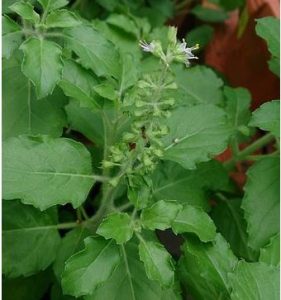By Heide Kennedy, Arizona Farm Bureau Communications Intern
When you think of basil, you probably think of how it’s used in Italian foods like pasta, pizza, pesto, or as a garnish on foods. But one that doesn’t typically come to mind is basil being used as a medicine. Tulsi, which is also known as holy basil, is a special kind of basil that originates in India and is a cousin to the typical basil used in many cuisines and seasonings today. Tulsi has been used medicinally for thousands of years due to its many health benefits which we’ll dive into below. 
According to registered dietician Devon Peart, tulsi has compounds that benefit our metabolic health, neurocognitive health and mood, as well as promote our immune system and lessen infections. Some of the specific areas in which tulsi has been shown to work include:
- Lowering blood sugar
- Improving LDL cholesterol
- Improving blood pressure
- Decreasing inflammation
- Improved response to stress
- Improved response to anxiety
- Lessened fatigue
- Increased immune system function
So now you might be wondering how you can take advantage of some of these health benefits that tulsi provides. Before you go and chew on a few raw tulsi leaves after using them as a garnish on an Italian dish, be warned that while it is edible raw, it has a very bitter and spicy taste to it. Rather than eat it by itself, Peart suggests that you instead try making tea by soaking the leaves and flowers in boiling water for about 10 minutes. Another option is to find tulsi extracts, essential oils, or supplements.
Consider giving tusli a try, whether you take it like as a supplement or enjoy it as a cup of tea. I personally have used the supplement version of tulsi for digestive issues and it found that it worked wonders!
For more articles about health and nutrition, check out the Fill Your Plate blog!

